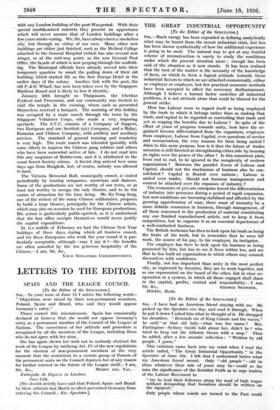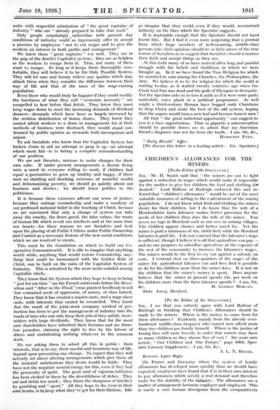[To the Editor of the SpEcrATon.]
SIR,—I have had an American friend staying with me. He picked up the Spectator one day, and read it through. When he put it down I asked him what he thought'f it: He shrugged his shoulders. " Reminds me of King Canute and the waves," he . said," or that old ladY—what was -her 'name ? Mrs. Partington—Sydney Smith told about her, didn't he ? who tried to 'keep out the Atlantic Ocean with a mop." Then he added, after a few seconds' reflection : " Written by old people, I guess."
This criticism came back into my mind when I read the- article called, " The Great Industrial Opportunity " in the. Spectator of: June 5th. I felt that I understood better what my American :friend meant. Only "old people "—old in: ideas whatever their tale of years may be—could so far miss the significance of the -Socialist Faith as to urge leaders of the Labour Movement to
" try to lead their followers along the road of high wages without demanding . that Socialism should be written on . the signpost."
Only people whose minds are turned to the Past could
write with respectful admiration of " the great captains of industry 7 who are " already prepared to take that road."
Only people surprisingly unfamiliar with present day conditions of industry could so ingenuously offer to accept a promise by employers " not to cut wages and to give the workers an interest in both profits and management."
We know those " great captains' too well. They are in the grip of the derelict Capitalist system ; they are as helpless as the workers to escape from it. True, not many of them want to escape. So long as it keeps them thoroughly com- fortable, they will believe it to be the Only Possible System. They will let ease and luxury relieve any qualms which May attack them when they consider the difference between their way of life and that of the mass of the wage-earning population.
Even those who would truly be happier if they could modify the harshness of what they call " economic necessity " are compelled to bow before that fetish. They know they must keep wages down to meet the increasing demands of dividend drawers—demands which have been so largely increased by the reckless distribution of bonus shares. They know they cannot admit workers to a share in management, for, if their methods of business were disclosed, they would stand con- demned by public opinion as stewards both incompetent and unjust.
To ask Socialists who know that the Capitalist System has broken down to aid an attempt to prop it up—an attempt which must fail—is to betray a complete misunderstanding of our position.
- - We are not theorists, anxious to make changes for their own sake. If under present arrangements a decent living were a -awed to everyone willing to work, if children had equal o)portunities to grow up healthy and happy, if there were no startling and shocking extremes of wasteful wealth and dehumanizing poverty, we should go quietly about our business and desires ; we should leave politics to the politicians.
It is because these extremes affront our sense of justice, because they outrage comradeship and make a mockery of our professed national belief in the teaching of Christ, because we are convinced that only a change of system can take away the cruelty, the fierce greed, the false values, the waste of human life which revolt our intellects and at the same time our hearts—for these reasons we are Socialists and 'look upon the placing of all Public Utilities under Public Ownership and Control as a necessary feature of the new social conditions which we are resolved to create.
This must be the foundation on which to build our Co- operative Commonwealth. It is idle to imagine that anything worth while, anything that would restore ConoradeShip, any- thing that could be harmonized with the Golden Rule of Christ; can be built on the ruins of the Capitalist System of Industry. This is admitted by the more acute-minded among Capitalist chiefs.
TheY know-that the System which they hope to keep in being " just for our time '" (as the French aristocrats before the Revo- lution said "After us the Flood ") was planted heedlessly in soil that contained seeds of oppression, of misery, of class hatred. They know that, it has created a master caste, and a wage-slave paste, with -interests that cannot be reconciled. They know that the result of the joint-stock company method of pro- duction has been to put the management of industry into the hands of men who can only keep their jobs if they satisfy share- holders with large dividends. They know that for the most part shareholders have inherited their fortunes and are there- fore - parasites, claiming• the right to live by the labour of others and contributing nothing whatever to the common
stock. • •
No use asking them to admit all this in public : their interests, that is to say,•their easeful and luxurious way of life, depend upon preventing any change. To expect that they will 'actively set about altering arrangements which give them all the material satisfactions they desire would be futile. They have not the requisite mental energy for this, even if they had the generosity of spirit The good seed of vigorous initiative has been choked -in them by-the deceitfulness of riches. They 'eat and drink too much ; they blunt the sharpness of intellect by gambling and " sport." All they hope to do, even in their :own hearts, is•to keep what they've got for their lifetime. Idle to imagine that they could, even if they would, reconstruct industry on the lines which the Spedator. suggests. It is deplorable enough that the Spectator should not isave learnt this. But I find. itreven more surprising that a journal from which large numbers of well-meaning, middle-class persons take their opinions should be so little aware of the true nature of Socialism as to sugge—st that Socialists should renounce their faith and accept things as they are.
-At -this faith many of us have arrived after long and painful struggle with: the beliefs and traditions in which we were brought up. In it we have found the True Religion for which we searched in vain among the Churches, the Philosophies, the Arts. We believe it to be the religion for which the world is waiting to-day, as it waited twenty centuries ago when the Great God Pan was dead and the gods of Olympus in disrepute. Yet the Spectator asks us to toss it aside as if it were some party makeshift, some plank in a political programme. As well might a third-century Roman have begged early Christians to drop Christ and make the best of the old system, hoping that the augurs would turn a new leaf and become honest men !
All that " the great industrial opportunity " can suggest to you is a base opportunism. That so gigantic a misconception should be possible forces me to admit that my American friend's diagnosis was not far from the truth.—I am, Sir, &c.,
HAMILTON FYFE.
" Daily Herald" Office.
[We discuss this letter in a leading article.- –En. Spectator.]











































 Previous page
Previous page